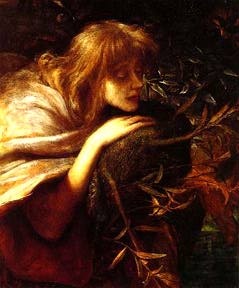Laertes recieves rosemary for remembrance and thoughts.
For Gertrude there is fennel and columbines. representing marital infidelity;
For Claudius, rue and a daisy denoting repentance and a love doomed to be unhappy.
When Ophelia dies by hanging up flower to dry, Gertrude notes that, "there is a willow grows aslant...." The tree Ophelia fell of off is a Willow tree. And Willows symbolizes FERTILITY in Medieval speech.
So from the flowers we have fertility in willows, and abortion/repenteance in Rue. Shakespeare loves to complicate things.
|

|